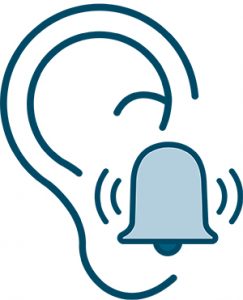 VA launches new ways to manage tinnitus among veterans
VA launches new ways to manage tinnitus among veterans
Tinnitus and hearing loss are among the most common service-connected disabilities suffered by veterans. While there is no cure or perfect solution, there are proven methods of treatment that help patients manage the persisting symptoms of tinnitus.
The COVID-19 pandemic, however, has forced physicians to develop new ways of reaching out to patients suffering from the disability.
“That’s when Tele-PTM becomes relevant,” said Dr. Tara Zaugg, a research audiologist for the National Center for Rehabilitative Auditory Research with the Department of Veterans Affairs Portland Health Care System.
Progressive Tinnitus Management (PTM) is a structured format for providing evidence-based care to those suffering from tinnitus. The process begins with an in-person meeting and physician’s referral. Patients will then undergo audiological evaluation—much of which is traditionally done in person—to determine their needs for further assistance in taming their symptoms.
“It’s at this point of the patient’s care where we start teaching coping strategies to improve quality of life with tinnitus,” said Zaugg. “That’s done collaboratively between an audiologist and behavioral health. That can be done in person and, before the pandemic, was done in person. But now, it can also be provided through telehealth. We have research-based evidence that shows this can be done effectively both in person and over telehealth.”
Most veterans with tinnitus do well with a basic level of care and counseling. There is, however, a subset of veterans who will continue to experience ongoing sleep disruptions, difficulty relaxing or concentrating in quiet places, and intense emotional reactions to their tinnitus that reduces the quality of life.
“That noise is my whole life,” said one patient of Zaugg. “It blows me out of bed in the morning, and it keeps me from sleeping at night. It affects everything. It’s got me by the nose, and it’s dragging me in the dirt. That’s where it’s at. It’s the most debilitating thing I’ve ever come across.”
In 2009, the VA endorsed the use of PTM for patients continually suffering from tinnitus. Since then, research has shown the coping strategies improve the quality of life with tinnitus for veterans who need assistance.
“Before PTM, I felt there was no medical solution to my problem,” said another patient. “I spent a lot more time stressing over it. The sessions helped me understand the condition better and ways of how to cope with it. With practice, I was able to not just cope with it but to dismiss it from most of my daily activities.”
Throughout the past year, in-person PTM has made the transition to remote services. Since the implementation of tele-PTM, clinicians have been able to reach veterans on a much broader scale.
“There are too many barriers when it comes to clinicians implementing this on their own,” said Zaugg. “This has resulted in veterans just not having access to PTM. Often it’s not offered in their communities and not offered at their VA, so the potential for the tele-PTM program allows for a highly trained workforce that specializes in this, who then can reach out to patients over a broader geographic area.”
Tele-PTM is in the early stages of implementation across VA facilities around the country, even as veterans are able to access regular in-facility services.
“We’ve certainly seen a great need for telehealth services over the past year,” said National Legislative Director Joy Ilem. “While we’re glad to see in-person services make a return, leveraging remote health capabilities can help serve veterans and allow them to manage their conditions in ways that are convenient and aligned with their needs.”
A study in 2019 done by the University of Texas at San Antonio showed that incidence rates of tinnitus in active-duty military service members between 2001 and 2015 ranged between 1.84% and 6.33%. That steady incline of cases has forced VA health care systems to reassess their ability to help veterans cope with these issues.
“I know how ringing in the ear affects PTSD and makes you think of some crazy things,” said another patient.
“Disabilities related to hearing have significant and substantial negative implications on veterans’ quality of life, employment and relationships,” Ilem said. “It’s one of the most isolating disabilities and is extremely widespread among veterans. Anything we can do to extend services to veterans in need of assistance is sincerely appreciated.”





